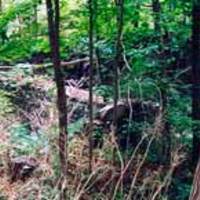The Factory Lot
Item
Description
The Factory Lot. Although not a part of the Payne estate, the 'factory lot' figures in many of the deeds. Its history illustrates that there were many small factories in Esopus, usually located near creeks and/or waterfalls to make use of the water or water power.
Just north of the Ascension Cemetery along Black Creek Road "on the stream that flows into Black Creek there were two factories in the 19th century. The stone foundations of one of them can still be seen and the frame building remained until 1909. This was George Garforth's. During the Civil War he made blankets here for the Union soldiers. In the Gazetteer and Business Directory of Ulster County for 1871-1872, the war being over, he is listed as now manufacturing horse blankets. The 1875 map says 'woolen factory'. The other factory was operated by George Kay, who had been born in Sheffield, England, where he had served an apprenticeship before coming to this country to work in cutlery factories here. ... George was at Esopus from 1860 to 1882. With his brother he invented a knife-fork combination which was used by the Union soldiers. When he sold his property in 1882, and the knife factory was moved to Walden, NY, the new owner leased it to a Mr. Gillies for a cooperage.
After several years Gillies moved to Marlboro. Then from 1903 to about 1930 John H. Beaver operated the cooperage at that site. There was a demand for open containers for storing the area's apples until the use of cold storage brought to an end the manufacture of barrels, and the cooperage was closed." --- Elizabeth Burroughs Kelley, p. 114 in Town of Esopus Story.
The deeds also refer to a grist mill and a saw mill with a saw mill pond at the site. Remains of the dam are also visible today.
Just north of the Ascension Cemetery along Black Creek Road "on the stream that flows into Black Creek there were two factories in the 19th century. The stone foundations of one of them can still be seen and the frame building remained until 1909. This was George Garforth's. During the Civil War he made blankets here for the Union soldiers. In the Gazetteer and Business Directory of Ulster County for 1871-1872, the war being over, he is listed as now manufacturing horse blankets. The 1875 map says 'woolen factory'. The other factory was operated by George Kay, who had been born in Sheffield, England, where he had served an apprenticeship before coming to this country to work in cutlery factories here. ... George was at Esopus from 1860 to 1882. With his brother he invented a knife-fork combination which was used by the Union soldiers. When he sold his property in 1882, and the knife factory was moved to Walden, NY, the new owner leased it to a Mr. Gillies for a cooperage.
After several years Gillies moved to Marlboro. Then from 1903 to about 1930 John H. Beaver operated the cooperage at that site. There was a demand for open containers for storing the area's apples until the use of cold storage brought to an end the manufacture of barrels, and the cooperage was closed." --- Elizabeth Burroughs Kelley, p. 114 in Town of Esopus Story.
The deeds also refer to a grist mill and a saw mill with a saw mill pond at the site. Remains of the dam are also visible today.

